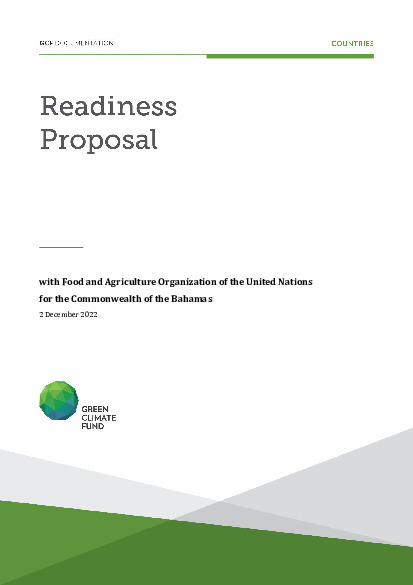Preparation of Strategic Framework to Reduce Deforestation and Forest Degradation and enhance adaptive capacity in the Bahamas

Preparation of Strategic Framework to Reduce Deforestation and Forest Degradation and enhance adaptive capacity in the Bahamas
The Bahamas has been highly affected by climate change during the last years, and it is expected to get worse in the future; for example, 80% of the Commonwealth of The Bahamas is within 1 meter of mean sea level, and the hydrological records indicate sea level has risen over the past century by 0.3 m. Since 1992, hurricanes and tropical storms have caused significant monetary loss and irreparable environmental damage to the archipelago.
In response to the challenges faced by climate change, the new government in January of 2022 created a Climate Change and Environmental Advisory Unit in the office of the Prime Minster thus raising the policy support and attention on Climate Change. The country also developed a National Climate Adaptation Policy (2006), and a National Energy Policy (2013), both of which are to be updates, and it amended its Forestry Act (2014), recognizing the importance of implementing climate change mitigations and adaptation policies that will reduce climate change impacts and mitigate GHG emissions.
Additionally, The Bahamas has also passed climate change legislation which requires the establishment of National Emission Registry to ensure it compliance related matters under the Paris Agreement and requires the government to develop initiatives to support those outcomes.
The 2015 Nationally Determined Contribution (NDC) has set a 30% emissions below 2010 levels by 2030. The NDC is also being revised with a review to further give importance to the fact that forestry is one of the two sectors where attention is needed to ensure achievement of the mitigation and adaptation targets covered by their contribution. The Bahamas has a long history of land use, land-use changes, and forestry dating back to the 1700s. The country has substantial natural resources comprising pine forests, coppice hardwoods, and mangrove forests.
Planning and monitoring forest and land-use activities for mitigation and adaptation are needed in the context of The Bahamas. The Second National Communication to the UNFCCC states the urgent need to integrate different data and information sources for climate change reporting. The LULUCF/(A)FOLU sectors were specially highlighted.
No up-to-date information was highlighted in The Bahamas' Second National Communication to the UNFCCC, and it is as well evident in the Global Forest Resource Assessment platform.
In summary, the country does not have the information and required pillars needed to access climate finance, such as payment for results, which can reduce emissions from deforestation and forest degradation and plan and strengthen adaptation options on nature-based solutions to fight against climate change. The key barriers targeted by the proposed include:
- Lack or low coordination and institutional arrangements within the Government of the Bahamas.
- Lack of a National Forest and Land-Use Monitoring System that can provide transparent and reliable information to decision-makers
- A lack of institutional framework exists under which agencies are required to provide data.
- No up-to-date information on the Land-use, Land-use Change, and Forestry (LULUCF) sector (including mangroves and other wetlands) is available.
- Insufficient technical capacities in LUCUCF Monitoring and MRV
This Proposal is founded on the theory that IF the Bahama, develop a REDD+ strategy, set up a National Forest and Land use monitoring system, implement a long-term capacity building for mainstreaming data collection, analysis and produces up-to-day data from the LULUCF, then deforestation and forest degradation will be reduced because national institutions would have an effective coordination mechanism, sustainable forest management would be promoted, and climate investment plans would be funded.
The five main outputs were defined for the scope of work that will address the barriers identified in the current sector context and will result in the development of a robust strategic framework to guide GCF investment in complementarity to other climate financiers, develop the relevant national agency and other stakeholder’s capacities for national forest and land use monitoring and sector-related adaptation planning.
The Proposal will contribute to the institutionalization of the MRV system for climate actions under the LULUCF as well as advancement of adaptation planning. The transparency component includes the definition and operationalization of institutional roles and responsibilities and the improvement of technical capacities of key national-level managers in areas relevant to the reporting, monitoring, and evaluation of climate actions, REDD+, early warning (wildfires, forest health), and environmental impact assessment.
New and updated information will be provided using modern technologies that will fill the gap of the accessibility in the terrain.
The primary beneficiary of this funding proposal is The Forestry Unit and other beneficiaries would include the Ministry of The Environment and Natural Resources, the Department of Agriculture in the Ministry of Agriculture, Marine resources & Family Island Affairs, and the Meteorology Department with the Department of Environment Protection and Planning (DEPP) as executing partner.
Gender dimensions have been integrated throughout the project to ensure that gender issues of climate change are reflected in the knowledge products, diverse viewpoints are reflected, and different types of actors' capacities are strengthened. FAO as Delivery Partner will ensure effective gender and social inclusion mainstreaming in line with the FAO Policy on gender equality, the FAO Environmental and Social Management Guidelines, and the GCF standards on gender equality and social inclusion
This Proposal will leverage to apply for additional funding to the GCF prioritized by the NDA related to the Forestry and Land Use Change Sector.